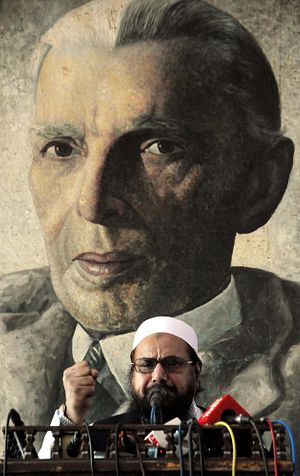A week ago, Pakistani media reported that Jamaat-ud-Dawa (JuD), a banned Islamist organization, has been running Sharia courts in the country. Reportedly, the courts set up by the organization’s chief, Hafiz Saeed, have been operating in at least seven Pakistani cities, including the capital Islamabad. Thus far, the courts have decided more than 5,000 cases.
These alarming revelations have put a big question mark on Pakistan’s National Action Plan (NAP) against extremism. What is more disturbing is that these courts have been operating in Pakistan’s urban centers. Previously, such courts were established by the Pakistani Taliban in the tribal regions of the country where the federal government does not exercise much control. However, the emergence of such courts in the heart of the country is an altogether different case.
A few weeks ago, Pakistani security agencies launched a much-awaited military operation in Punjab. But ironically, so far, the action has not targeted the Islamic militant groups based in the province, including JuD. Rather, the operation has been against criminals and bandits.
One can argue that these courts could not have existed without the knowledge of the country’s security agencies. It follows that either these courts have been allowed to work or the government doesn’t want to take the risk of going after the group, which has a substantial support base in Punjab, Pakistan’s most populated province.
Furthermore, the establishment of these courts also highlights another fact: that Pakistan’s regular judicial system has become inept and people have lost their faith in the country’s civil court system. Traditionally, Pakistan’s judiciary is not known for its independence and has consistently been exploited by the military to legitimize their rule; even civilian governments have undermined the judiciary on various occasions. Last year, the Pakistani Parliament passed an amendment to the constitution to establish special military courts. The military courts were set up because the civilian courts had been unable to decide on cases related to militancy.
JuD is not the only Islamist organization that has set up Sharia courts in the country. Arif Jamil, an expert on the group and an author of multiple books on Lashkar-e-Taiba, says that “JuD is not the only Islamist organization that runs an illegal judicial system in the country; most jihadist groups are ‘dispensing’ Islamic justice in accordance with their interpretation of the Sharia. The madrassahs (religious seminaries) are often used as Sharia courts.”
In an interview, JuD’s chief, Hafiz Saeed said that his organization doesn’t believe in the idea of state within the state. “We believe in the Constitution and laws of the land and do not want to run any parallel system,” said Saeed. On the other hand, however, he admitted that his organization has been dispensing justice through these courts from the past 22 years. “The JuD wants to establish the Sharia rule in Pakistan and beyond, and it has created an elaborate judicial system that can replace what the organization considers an ‘un-Islamic’ judicial system,” said Arif Jamil.
The organization’s spokesperson justified the establishment of the Sharia court by arguing that is “is not a parallel system to the constitutional courts of the country. It is an arbitration court, which decides disputes with the consent of the parties.” However, reports say that people are “summoned” to these courts with a threat of severe punishment “under the Sharia laws” if they fail to appear.
While the NAP promises indiscriminate action against all terrorist groups, JuD’s open Sharia court system is a reflection of the blatant reality that the state is not yet ready to take on all militant groups. Without a doubt, inaction against the group will only add to Pakistan militant challenges.

































